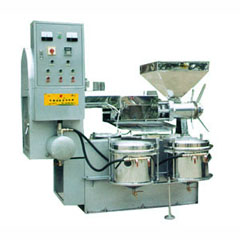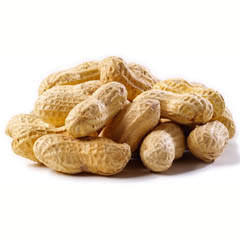
Peanut Oil Press
The peanut, or groundnut (Arachis hypogaea), is a species in the legume family (Fabaceae) native to South America, Mexico and Central America. It is an annual herbaceous plant growing 30 to 50 cm (0.98 to 1.6 ft) tall. The leaves are opposite, pinnate with four leaflets (two opposite pairs; no terminal leaflet), each leaflet 1 to 7 cm long and 1 to 3 cm broad. The flowers are a typical peaflower in shape, 2 to 4 cm across, yellow with reddish veining. After pollination, the fruit develops into a legume 3 to 7 cm (1.2 to 2.8 in) long, containing 1 to 4 seeds, which forces its way underground to mature.
Peanuts are known by many local names, including earthnuts, ground nuts, goober peas, monkey nuts, pygmy nuts and pig nuts; Monkey nuts is often used to mean the entire pod.
Peanut oil (arachis oil) is an organic material oil derived from peanuts, noted to have the slight aroma and taste of its parent legume. In the UK it is marketed as "groundnut oil".
Peanut oil is often used in cooking, because it has a mild flavor and its relatively high cooking temperature. Its high monounsaturated content makes it heart-healthy and resistant to rancidity. There are several types of peanut oil including: aromatic roasted peanut oil, refined peanut oil, extra virgin or cold pressed peanut oil and peanut extract. Studies have shown that refined peanut oil is safe for peanut allergic individuals because the protein is destroyed during the processing. In fact, refined peanut oil is exempt from allergen labeling laws.
The Method of Peanut Oil Press:
1. Screening: first with the dustpan toss out the broken peanut shells and straw, etc., and then go round Luo screen rocks, soil and other debris litter and iron types. Require screening goal is to minimize impurities in epigenesis-jen, a maximum of 0.1%.
2. Billet grind: grinding stone used to grind peanuts, peanuts do not shop when you grind too thick, so as to avoid uneven billet grind, grind out Green thickness of 0.3 ~ 0.5 mm is better.
3. Steamed blank: Available wok Longti until the water boiled after the Green will be a good grind evenly tiles on it. SAIC to be uniform, after a good steam demands a twist see oil at around 8.5% moisture, temperature higher than 100 ℃.
4. Mounted stack: After a good steaming Pizi shall be cooked billet, to rapidly package cake loaded pile, packet cake to use a single ring, cake ring up and down I want to align, the straw should be evenly cooked blank bottles and after going to the compaction foot level, so that the middle is slightly higher. Request package cake to be fast and flat, fitted and straight stack to be positive in order to achieve a modest extension of press time, maintain the cake requirements.
5. Head Road, squeezing: Human Spiral pressing to put insulation of room, installed a good cake immediately after the press, to gradually pressed, ground soft reduction pressure, generally about 90% to reach out the oil, the demolition of pressing and unloading cake , and scrape off with a machete cake edge (should not be crushed, together with the cake, it is best mixed into the Preform to go, and then squeeze the head and Road).
6. Crushing compacts: to scrape off the head of Road side cake cake to smash the stone grind, the purpose of passing through three sieve until all the clay so far.
7. Secondary crushing: the aforementioned operations are the same.
8. Twice the gross proceeds of the oil squeeze combined filtration, filter can be eaten after the peanut oil. Residue can be mixed with Preform repeated squeezing.
Health benefits
Peanuts are nutrient rich, providing over 30 essential nutrients and phytonutrients. Peanuts are a good source of niacin, folate, fiber, magnesium, vitamin E, manganese and phosphorus. They also are naturally trans fat, sodium free and provide seven grams of protein per serving, the most protein of any nut.
While peanuts are considered high in fat, they primarily contain “good” fats also known as unsaturated fats. One serving of peanuts contains 11.5 g unsaturated fat and 2 g of saturated fat. In fact, peanuts have been linked well enough to their heart healthy benefits, in 2003, the Food and Drug Administration released a health claim recognizing peanuts in helping maintain your cholesterol.
Peanut oil is most commonly used when frying foods, particularly french fries and chicken.
Peanut oil is a monounsaturated fat. As such it may be substituted into a diet to reduce the negative health effects of eating trans fat and saturated fat.

